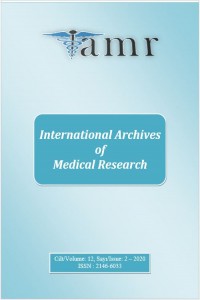Abstract
Supporting Institution
Yok
Project Number
Yok
Thanks
yok
References
- 1. Lehmann S, Milde-Busch A, Straube A, von Kries R, Heinen F. How specific are risk factors for headache in adolescents? Results from a cross-sectional study in Germany. Neuropediatrics. 2013; 44(1):46-54. doi: 10.1055/s-0032-1333432.
- 2. Headache Classification Committee of the International Headache Society (HIS). The International Classification of Headache Disorders. 3rd edition (beta version). Cephalalgia. 2013; 33(9):629-808.
- 3. American Psychiatric Association (APA). Diagnostical and Statistical Manual of Psychiatric Disorders, Fifth Edition, Washington DC., 2013.
- 4. Saglam M, Arikan H, Savci S, Inal-Ince D, Bosnak-Guclu M, Karabulut E, Tokgozlu L. International physical activity questionnaire: reliability and validity of the Turkish version. Percept Mot Skills 2010; 111(1):278-284.
- 5. Eser E, Fidaner H, Fidaner C, Eser SY, Elbi H, Göker E. Psychometric properties of the WHOQOL-100 and WHOQOLBREF. J Psychiatry Psychol Psychopharmacol 1999; 7(2): 23-40.
- 6. Giglio LM, Magalhaes PV, Andreazza AC, Walz JC, Jakobson L, Rucci P et al. Development and use of a biological rhythm interview. J Affect Disord 2009; 118:161-165.
- 7. Aydemir O, Akkaya C, Altınbaş K, Kora K, Sücüllüoğlu D, Akdeniz F, Kalaycı F, Oral ET, Vahip S. Reliability and validity of Turkish version of Biological Rhythms Interview of Assessment in Neuropsychiatry. Anatolian Journal of Psychiatry 2012; 13:256-261.
- 8. Buysse DJ, Reynolds CF, Monk TH. The Pittsburgh Sleep Quality Index: a new instrument for psychiatric practice and research. Psychiatry Res 1989; 28:193- 213.
- 9. Agargun MY, Kara H, Anlar O. Pittsburgh Uyku Kalitesi İndeksi’nin Geçerliği ve Güvenirliği. Turk Psikiyatri Derg 1996; 7:107-11. [In Turkish]
- 10. Bruni O, Russo PM, Ferri R, Novelli L, Galli F, Guidetti V. Relationships between headache and sleep in a non-clinical population of children and adolescents. Sleep Med. 2008; 9(5):542-548.
Adolescents with Migraine Experience More Daytime Dysfunction than Other Counterparts: A Descriptive Cross-Sectional Study
Abstract
Background: Relation of circadian factors (including sleep, physical and social activities, eating patterns) in adolescents with primary headaches is still unclear. The aim of this study is to examine circadian rhtyhm factors of children and adolescents with primary headaches and its relation with perceived quality of life and sleep quality as well.
Methods: Adolescents aged 14-18 years with primary headaches were examined via International Physical Activity Questionnaire-Short Form (IPAQ-SF), World Health Organization Quality of Life-Short Form (WHOQOL-BREF), Biological Rhythm Interview of Assesment in Neuropsychiatry Scale (BRIAN) and Pittsburg Sleep Quality Index (PSQI). SPSS 17.0 was used for statistical analyses. p<.05 was accepted as significant.
Results: Of 101 adolescents with primary headaches and 97 healthy counterparts were included. Of 78.3% were girls. Adolescents with primary headaches had similar circadien pattern of sleep, physical and social activity and eating habits, as well as perceived quality of life and sleep quality compared to the healthy counterparts (for all variables p>.05). In terms of specific headaches, there was a significance for having migraine in terms of higher daytime dysfunction, a subscale of PSQI (F(2) = 4.209, p = .016) and lower environmental quality of life, a subscale of WHOQOL-BREF (F(2) = 5.034, p = .007). Circadien rhythm scores were significantly and negatively correlated with all domain of QoL scores and positively correlated with sleep quality index scores.
Conclusion: Migraine affects daytime functioning and environment’s quality of life perceived. Countermeasures related to improving daytime functions of adolescents with migraine could result in better quality of life perceived.
Keywords
Project Number
Yok
References
- 1. Lehmann S, Milde-Busch A, Straube A, von Kries R, Heinen F. How specific are risk factors for headache in adolescents? Results from a cross-sectional study in Germany. Neuropediatrics. 2013; 44(1):46-54. doi: 10.1055/s-0032-1333432.
- 2. Headache Classification Committee of the International Headache Society (HIS). The International Classification of Headache Disorders. 3rd edition (beta version). Cephalalgia. 2013; 33(9):629-808.
- 3. American Psychiatric Association (APA). Diagnostical and Statistical Manual of Psychiatric Disorders, Fifth Edition, Washington DC., 2013.
- 4. Saglam M, Arikan H, Savci S, Inal-Ince D, Bosnak-Guclu M, Karabulut E, Tokgozlu L. International physical activity questionnaire: reliability and validity of the Turkish version. Percept Mot Skills 2010; 111(1):278-284.
- 5. Eser E, Fidaner H, Fidaner C, Eser SY, Elbi H, Göker E. Psychometric properties of the WHOQOL-100 and WHOQOLBREF. J Psychiatry Psychol Psychopharmacol 1999; 7(2): 23-40.
- 6. Giglio LM, Magalhaes PV, Andreazza AC, Walz JC, Jakobson L, Rucci P et al. Development and use of a biological rhythm interview. J Affect Disord 2009; 118:161-165.
- 7. Aydemir O, Akkaya C, Altınbaş K, Kora K, Sücüllüoğlu D, Akdeniz F, Kalaycı F, Oral ET, Vahip S. Reliability and validity of Turkish version of Biological Rhythms Interview of Assessment in Neuropsychiatry. Anatolian Journal of Psychiatry 2012; 13:256-261.
- 8. Buysse DJ, Reynolds CF, Monk TH. The Pittsburgh Sleep Quality Index: a new instrument for psychiatric practice and research. Psychiatry Res 1989; 28:193- 213.
- 9. Agargun MY, Kara H, Anlar O. Pittsburgh Uyku Kalitesi İndeksi’nin Geçerliği ve Güvenirliği. Turk Psikiyatri Derg 1996; 7:107-11. [In Turkish]
- 10. Bruni O, Russo PM, Ferri R, Novelli L, Galli F, Guidetti V. Relationships between headache and sleep in a non-clinical population of children and adolescents. Sleep Med. 2008; 9(5):542-548.
Details
| Primary Language | English |
|---|---|
| Subjects | Internal Diseases |
| Journal Section | Research |
| Authors | |
| Project Number | Yok |
| Publication Date | December 27, 2020 |
| Published in Issue | Year 2020 Volume: 12 Issue: 2 |
Cite
All articles published by DUJE are licensed under the Creative Commons Attribution 4.0 International License. This permits anyone to copy, redistribute, remix, transmit and adapt the work provided the original work and source is appropriately cited.


